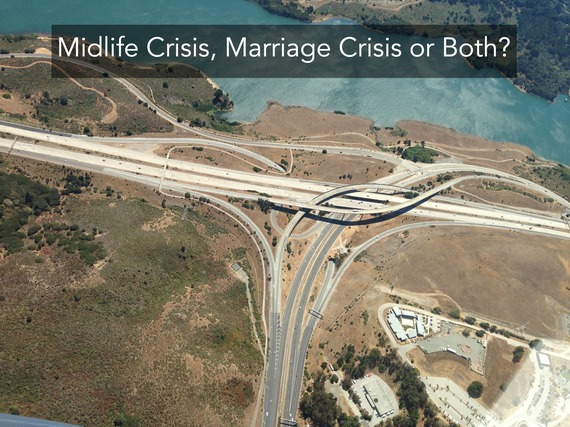What do you do when someone you thought you knew like the back of your hand mutates into someone you don't recognize?
The midlife crisis. Or that's what we tend to call it.
She says maybe she never really loved you. She wants to be independent. She hangs out a lot more with her divorced girlfriends. Suddenly, you go from being the man she wanted to grow old with to the guy she wouldn't be caught dead with.
He starts working out. Guards his cell phone. Buys new, smarter-looking clothes. It's classic but you don't want to see it. Then he lets you know there's "someone else". He met her on Facebook. And he wants a divorce.
You've been married 32 years.
It's a crisis all right. A midlife crisis maybe. A definite marriage crisis.
CBS did a report in 2011 on the current research on midlife. It stated that the huge majority of folks take midlife in stride. Psychological theories add that when you have led a life where you have been able to follow some passion or interest, whether it's your job, your family, an activity or talent, that you will be fulfilled. In midlife, you become someone who wants to give back. To your community. Your culture. Your family. Your relationships.
Erikson, who developed a theory of the stages of human development, defined the issue in midlife as the decision between "generativity" and "stagnation". You are going to blossom or wilt. If happy, you know what you stand for.
Most midlifers fare pretty well.
Yet those that are not content get a lot of attention. Because they can cause a lot of hurt.
The two things -- a marriage crisis and a midlife crisis -- can obviously be intertwined. One of the partners in the relationship becomes unsure of themselves. Of their choices. Of what their life means. What have they missed? How much time is there left to enjoy? To learn? To experience? That frantic self-doubt and fear can lead to leaving a partner, who seems to symbolize only what was. Not what could be.
Cathy Meyer, the divorce support expert for About.com, stated that men have midlife crises out of fear. Fear of death. Fear of aging. Fear of losing power. Women? Out of an awareness of opportunity. Ms. Meyer's observation is that women's focus has been more about getting children grown, security established. After that is done, her own life opens in an exciting, even seductive way. She further reports that if someone has not been attentive to their own needs -- has made their whole life about others -- making a living or raising children -- no matter their gender, they are more likely to be drawn toward drastic change in midlife.
Esther Perel, a highly sought after speaker on the subject, believes that infidelity can emerge from happy marriages as well as unhappy ones. That they are more about reconnecting with parts of the self that are being rediscovered or perhaps discovered for the first time.
If you believe yourself to be in a midlife crisis:
A midlife crisis can be distinct from a marriage crisis.
Maybe your partnership is in trouble. Maybe you have fallen into a rut. Have stopped expressing gratitude. Maybe there are some dynamics or issues that have always been disappointing that you are tired of. That if you talked about, might be changed.
If that's the case, you can confront those things. Try to do something about them. If your partner is willing. Often, if they hear you are considering ending your commitment, their desire to listen and change will increase.
Perhaps you are in a midlife crisis. All by yourself.
A question I ask:
"What makes you think you have to leave your partner to find the fulfillment you desire?"
You need to figure out what your life is missing. Something you have been afraid to try. Or too busy to develop in yourself. As Ms. Perel would say, discovering yourself.
It may mean really changing things. Asking your partner to hang in there with you and adapt. Maybe you decide that the high-powered corporate world is no longer for you and you want to retrain as a massage therapist. Maybe you want to train for a marathon. Go to college for the first time.
Try to discover that first. See what happens in the relationship if you get more excited about your own life.
If your partner is in a midlife crisis:
What if you are on the receiving end? If you get told that your partner is unsure of his or her commitment to you? Maybe they have even involved someone else?
Much of the response to this question lies in the context. The situation. There is one thing I have learned.
Know if you are considering divorce, that it will always be only yours. Not your mother's. Not your best friend's. Not your therapist's or your lawyer's. Yours. You will be living whatever benefits come from it, and what painful consequences might be. Wait until you feel ready to make that decision.
If you are getting feedback that you are being terribly self-destructive, then you should probably take that into account.
But it's still your choice.
You can find more of Dr. Margaret on her website, DrMargaretRutherford.com! SUBSCRIBE and receive a free copy of her eBook, "Seven Commandments of Good Therapy", a basic guide on how to evaluate a potential therapist or your current therapist.
Originally published by Midlife Boulevard.
Photo: Unsplash.com
Earlier on Huff/Post50:


